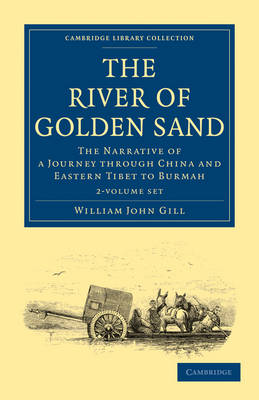Cambridge Library Collection - Travel and Exploration in Asia
1 primary work • 4 total works
Volume 2
William Gill (1843-1883) was an explorer and commissioned officer in the Royal Engineers. After inheriting a fortune from a distant relative in 1871, Gill decided to remain in the Army and use his inheritance to finance explorations of remote countries, satisfying his love of travel and gathering intelligence for the British government. He was awarded a gold medal by the Royal Geographical Society in 1879 for his scientific observations on his expeditions. This two volume work, first published in 1880, is Gill's account of his expedition from Chengdu, China through Sichuan, along the eastern edge of Tibet via Litang, to Bhamo in Burma, a region little explored by westerners before him. Gill describes in vivid detail the cultures, societies and settlements of the region, and their political and economic systems. Volume 2 recounts his travels across the plateau to the upper reaches of the Irrawaddy, partly retracing Marco Polo's route.
The River of Golden Sand 2 Volume Set
by William John Gill and Sir Henry Yule
Published 9 September 2010
William Gill (1843-1883) was an explorer and commissioned officer in the Royal Engineers. After inheriting a fortune from a distant relative in 1871, Gill decided to remain in the Army and use his inheritance to finance explorations of remote countries, satisfying his love of travel and gathering intelligence for the British government. He was awarded a gold medal by the Royal Geographical Society in 1879 for his scientific observations on his expeditions. This two volume work, first published in 1880, is Gill's account of his expedition from Chengdu, China through Sichuan, along the eastern edge of Tibet via Litang, to Bhamo in Burma, a region little explored by westerners before him. Gill describes in vivid detail the cultures, societies and settlements of the region, and their political and economic systems.
William Gill (1843-1883) was an explorer and commissioned officer in the Royal Engineers. After inheriting a fortune from a distant relative in 1871, Gill decided to remain in the Army and use his inheritance to finance explorations of remote countries, satisfying his love of travel and gathering intelligence for the British government. He was awarded a gold medal by the Royal Geographical Society in 1879 for his scientific observations on his expeditions. This two volume work, first published in 1880, is Gill's account of his expedition from Chengdu, China through Sichuan, along the eastern edge of Tibet via Litang, to Bhamo in Burma, a region little explored by westerners before him. Gill describes in vivid detail the cultures, societies and settlements of the region, and their political and economic systems. Volume 1 covers the area around Chengdu and includes an introductory chapter by the eminent orientalist Henry Yule (1820-1889).
William Gill (1843-1883) was an explorer and commissioned officer in the Royal Engineers. After inheriting a fortune from a distant relative in 1871, Gill decided to remain in the Army and use his inheritance to finance explorations of remote countries, satisfying his love of travel and gathering intelligence for the British government. He was awarded a gold medal by the Royal Geographical Society in 1879 for his scientific observations on his expeditions. This two volume work, first published in 1880, is Gill's account of his expedition from Chengdu, China through Sichuan, along the eastern edge of Tibet via Litang, to Bhamo in Burma, a region little explored by westerners before him. Gill describes in vivid detail the cultures, societies and settlements of the region, and their political and economic systems. Volume 2 recounts his travels across the plateau to the upper reaches of the Irrawaddy, partly retracing Marco Polo's route.


